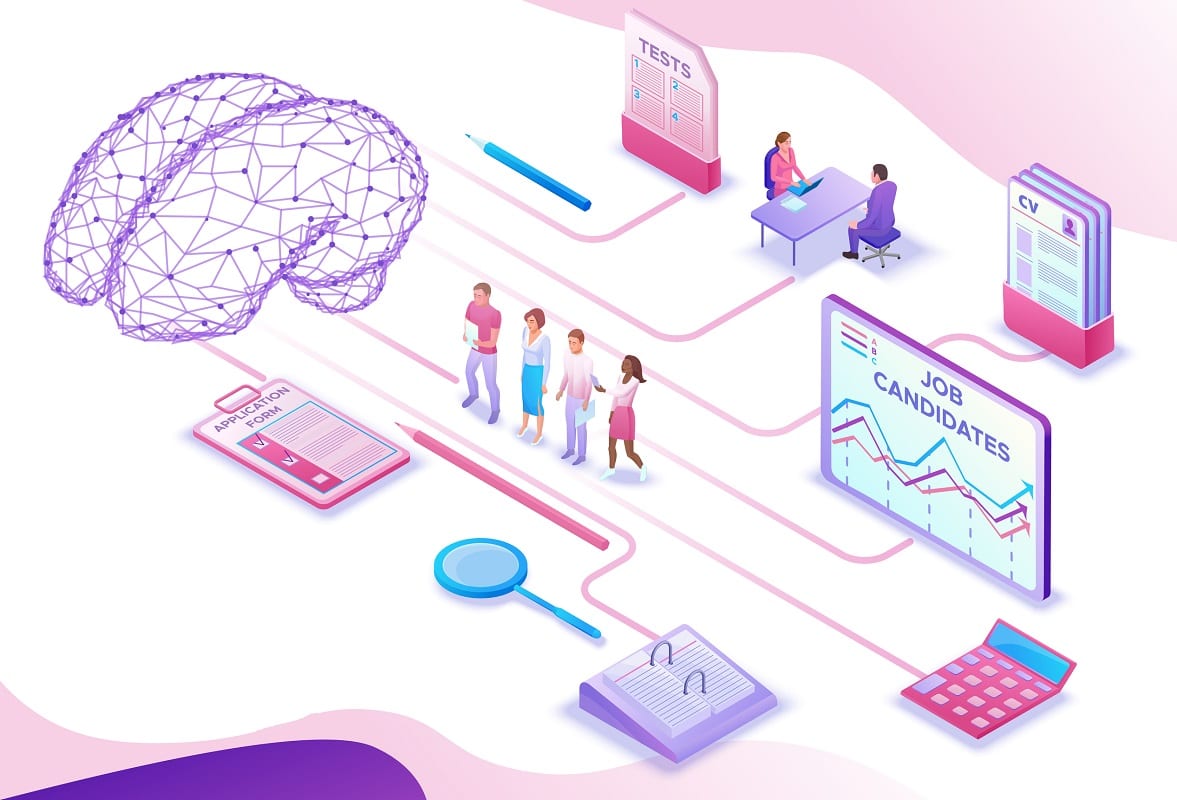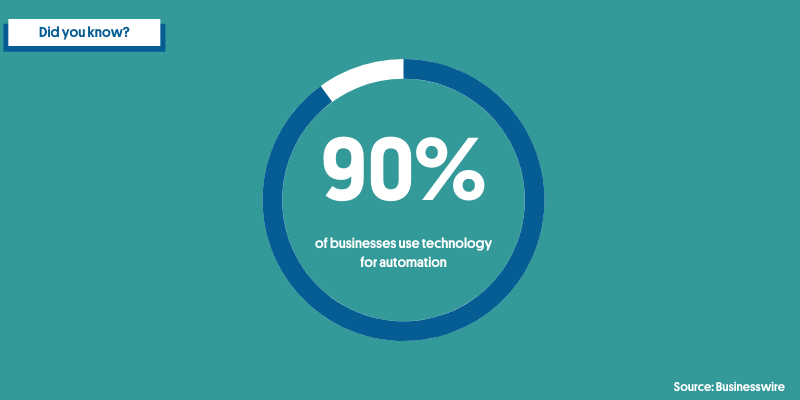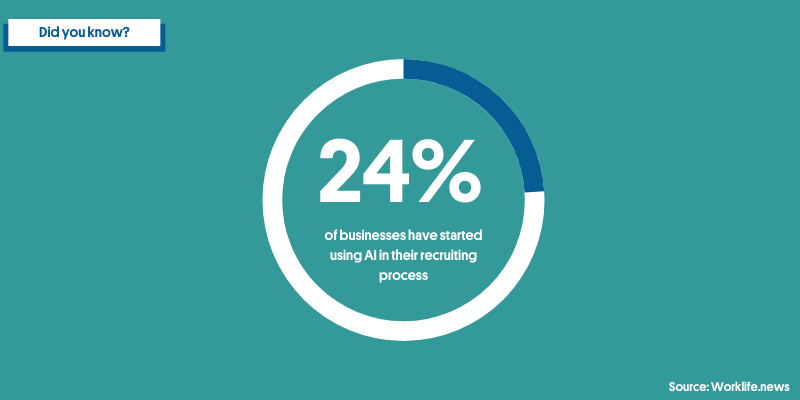Pros and Cons of Using AI in Recruiting

According to Forbes, 84% of business leaders have said that they believe artificial intelligence (AI) is the trend in the future that will help them stay competitive and have an advantage in the job market.
While AI recruitment tools are powerful for hiring managers and recruiters, there are still some pros and cons to using them, especially in recruiting. However, do the pros outweigh the cons?
Keep reading to get a complete picture of what AI could look like in your recruiting process and whether it’s suitable for your business or not.
Pro: Reduce Administration Time
90% of businesses use automation software to cut down on administrative time and tasks, and AI can also help with that. While there is different automation software, AI is great at recognizing patterns and can improve automation efficiency.

You can use this automation to take care of admin tasks, like screening candidates, searching for qualifications and skills, answering candidate questions during off-hours, analyzing data, and setting up interviews for applicants.
The software can also screen resumes and organize applications in your applicant tracking software (ATS) so that you can easily find and manage them.
Pro: Better Communication
While recruiters want to build a relationship with all kinds of candidates, it can be challenging to manage and build a relationship with a lot of them at once. However, AI can help to improve your communication.
AI is very popular in chatbots, and customer service-focused companies have been using it for years. Now, recruiters can use it in their recruiting process.
AI can help your candidate outreach by acting as a representative to answer questions that a candidate might have. The chatbot can answer simple questions that you don’t necessarily need to take time to respond to. If a candidate has a question that AI can’t answer, then you’ll be able to step in and talk with the candidate.
There is even some new AI technology called Personality AI. This technology analyzes how a candidate interacts and their personality traits and relays this information to you. With this information, you can formulate a better strategy to build a genuine relationship with the candidate.
Cons: Lack of Human Judgment
While AI can be great at predicting patterns, sometimes you need human judgment involved in the process, especially when it comes to screening applicants.
If you’re not careful, your AI could be reading insufficient data and then be stuck in a process suggesting the same types of candidates for your business. That doesn’t mean that you shouldn’t use AI. Instead, while AI is an excellent place to get you started, you should look back over and review the decisions AI made and ensure that you agree.
Pro: More Quality Candidates
24% of businesses use AI to acquire top talent. This can help bring in more qualified candidates if you only get a few applicants to apply. AI can also help recruiters cut down any time wasted by looking through resumes of people who aren’t qualified.

AI can act as a candidate screening system through candidates and resumes and pick out the most suitable candidates for a job. When you find those candidates, you can then reach out to them and focus on creating a relationship with them now that you have more time to spend since you aren’t managing the screening step.
Con: May Be Less Accurate
AI can only function when you feed it data, so if you have bad or insufficient data, your AI may not be accurate enough for your recruiting process. There are still some relatively new areas of AI, and you may have a few errors from time to time.
For example, a candidate might use a different phrase or keyword to describe a skill. If the AI doesn’t have enough data to realize that the skill is transferable, it may skip over a qualified candidate.
On the flip side, many candidates also learn how AI works and realize the importance of keywords. This could lead to them putting keywords into their resume that makes them seem more qualified than they are. However, AI won’t be able to tell the difference and will still recommend them as qualified candidates.
That’s why it’s always important to look over the results from AI before you hand a list of candidates over to the hiring manager. You should also ensure that you give it quality data to read.
Pro: Speeds Up Recruitment Process
Depending on what industry you’re recruiting for, the average recruiting process could take anywhere from twelve to forty days. But some research also suggests that the best candidates are off the job market in just ten days.
If you want to ensure that you’re hiring the most qualified applicants, you can use AI-based tools to speed up your hiring process. Whether by improving job descriptions, screening applicants, streamlining the interview setup process, or identifying top talent, AI can make your recruitment processes more efficient. The longer your hiring process takes, the more opportunity a competitor has to snatch up the candidate you were thinking of hiring.
Con: Regulations Are Changing
While using AI in the recruiting process can make your hiring process more fair and unbiased, there are some cases where there can still be bias. That’s why you need to be careful when selecting AI tools to use, or you could have biased hires.
Because of this, some countries are regulating the use of AI in the recruiting process to ensure that there is still a fair hiring process for everyone. For example, New York proposed legislation to regulate how AI algorithms work in the hiring process. While nothing has been passed, it is something to consider when looking for the right recruiting solution.
Con: Can Be Impersonal
One thing that AI is not great at doing is building a solid relationship with candidates. While AI chatbots can be great for answering frequently asked questions, a recruiter still needs to create an authentic candidate relationship.
However, AI can help recruiters build that relationship by automating and taking care of other tasks that don’t need a personal touch. Recruiters can get back to doing what they love: creating a relationship with candidates to recruit them for an open position successfully.
This is one reason why AI will never fully take the place of a recruiter’s job. Human decisions are always needed in HR areas, like interviewing and deciding which candidate would be the best fit for the job. But AI can help you get there faster.
Pro: Reduces Human Bias
Regardless of how hard the best recruiter can try, they may still have some unconscious human biases. Some recruiters might make decisions based on different factors, even with proper training and care.
This is where AI can come in. It can ignore other factors like a candidate’s personality, education, gender, or ethnicity. Instead, it can focus on the qualifications, experience, and skills that might make them a great candidates.
Xuan Smith, CTO of Recruiter.com, stated that Recruiter.com’s AI-based tool follows a similar strategy to reduce bias: “This software identifies people based on their work history, how long they were at their job, and what their company does. However, we don’t consider education in our algorithm because we don’t find it to be a huge predictor of success.”
Start Using AI in Recruitment Today
For most companies, the pros will outweigh the cons when using AI in the recruiting process. However, you need to ensure that you choose the right tool with the correct data for the best results.
Recruiter.com takes the time to ensure that good data is going into their AI algorithm so that you can have a fair hiring process and find the most qualified candidates, regardless of their background, ethnicity, or gender.
If you’re interested in learning more about how our AI recruiting software or other recruiting solutions could help you, contact us today!
Get the top recruiting news and insights delivered to your inbox every week. Sign up for the Recruiter Today newsletter.
